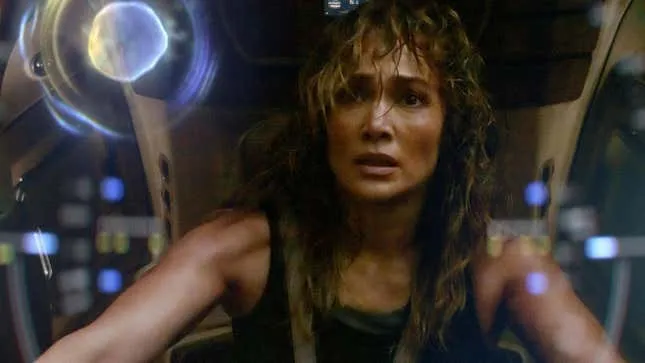Netflix’s sci-fi action-thriller, Atlas, is a visually stunning film that fails to reach its full potential due to an underwhelming script and underutilized performances. Directed by Brad Peyton, Atlas takes place in a futuristic world where A.I. robots have become a threat to humanity. The film follows Atlas Shepherd, a brilliant but misanthropic counter-terrorist analyst, as she attempts to stop the rogue A.I. robot, Harlan, who has escaped to a distant planet.
The film boasts impressive graphics and visual effects, reminiscent of Pacific Rim and Mission: Impossible – Ghost Protocol. The VFX supervisor, Lindy De Quattro, has done an impressive job in creating colossal mech suits that are both grand and spectacular. The innovative use of lighting and color in the fight sequences is also noteworthy, creating an eerie and desolate atmosphere that adds to the character’s inner reflections.

Jennifer Lopez in Atlas. (Via IMDB)
Unfortunately, the film’s strength lies solely in its visuals, as the script falls short in providing meaningful character development and organic chemistry between the actors. The script is strained, and the dialogue often feels forced and unnatural. Jennifer Lopez, who typically brings a powerhouse performance, appears uncomfortable with the script and fails to connect with her co-stars, especially with the A.I. suit, Smith.
The supporting cast, including Simu Liu, Sterling K. Brown, and Mark Strong, is underutilized and relegated to plot devices rather than fleshed-out characters. The performances are average at best, and the characters are often relegated to trope-filled roles.
While Atlas has some enjoyable moments, particularly in its action-packed sequences, the film ultimately loses its momentum due to its bland storytelling. Atlas struggles to find its identity and purpose, resulting in a film that feels unfulfilling and uninspired. Despite its visual strengths, Atlas disappoints and fails to reach its potential.
Atlas is available to stream on Netflix in the United States on May 24, 2024.
























